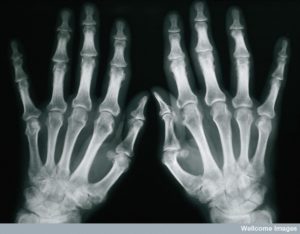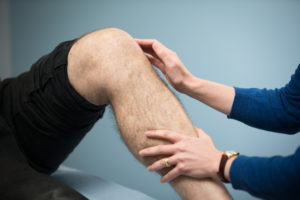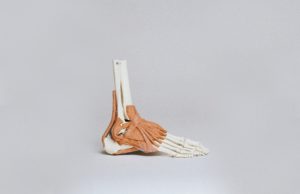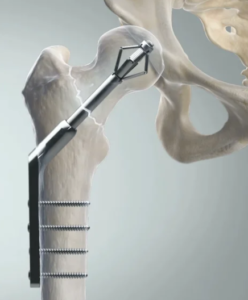A University of Oxford study has found that the use of metal K-wires, commonly known as ‘pins’, to hold broken wrist bones in place while they heal are no better than a traditional moulded plaster cast. The DRAFFT2 study by researchers from the university’s Nuffield Department of Orthopaedics, ... READ MORE
News for Musculoskeletal
Drug could more effectively treat patients hospitalised with COVID-19 pneumonia, research finds
A proof-of-concept trial involving Oxford researchers has identified a drug that may benefit some patients hospitalised with COVID-19 pneumonia. The CATALYST Trial tested the rheumatoid arthritis treatment namilumab as a potential therapeutic to treat patients who are hospitalised with COVID-19 ... READ MORE
New Senior Research Fellows named
The NIHR Oxford BRC has announced the appointment of its latest group of Senior Research Fellows – the third cohort of emerging research leaders to receive the accolade. Like in 2020, this year’s selection process was a coordinated effort by the Oxford BRC and its partners in the NIHR ... READ MORE
Study reveals three most important aspects of care for hip fractures
Older patients with hip fractures recover better if they receive treatment under the supervision of both a surgeon and a specialist in elderly care; are checked to avoid future falls; and are assessed for memory problems. These are the findings of the World Hip Trauma Evaluation (WHiTE) study, ... READ MORE
Oxford academics named NIHR Senior Investigators
Four academics supported by the NIHR Oxford Biomedical Research Centre have been awarded a prestigious national award. The University of Oxford professors have been named National Institute of Health Research (NIHR) Senior Investigators in recognition of being “among the most prominent and ... READ MORE
New centre aims to help companies conduct more efficient trials
A new clinical therapeutics centre has been set up by the University of Oxford to help life sciences companies identify interventions that have the greatest potential to deliver patient benefit, and so bring down the cost of early phase clinical trials. The Oxford Centre for Clinical ... READ MORE
Results of fragility hip fracture trial published
A trial to compare the effectiveness of two different implants used to treat broken hips has found no clinically relevant difference between treatments. WHiTE Four clinical trial for the treatment of fragility hip fractures was conducted by the Oxford Clinical Trials Research Unit (OCTRU), with ... READ MORE
New trial on use of anti-TNF drugs to treat Covid-19 in care homes
Researchers at the University of Oxford are starting a new study to explore the effectiveness of a common arthritis drug, adalimumab, as a treatment for patients with COVID-19 in the community, especially care homes. Recent studies of patients with COVID-19 have shown that patients already ... READ MORE
Key discovery in psoriatic arthritis points way for developing targeted treatments
A new study has revealed psoriatic arthritis may be activated by the same trigger in different patients. Researchers from the University of Oxford and the Wellcome Sanger Institute identified high levels of a specific receptor in immune cells from psoriatic arthritis patients, giving the ... READ MORE
Hydroxychloroquine study finds increased cardiovascular risk with azithromycin
The combination of hydroxychloroquine (HCQ) and azithromycin (AZM) has been linked to significant cardiovascular risks, including mortality, in the largest safety study ever performed on both HCQ and HCQ+AZM. This network study, led by the Observational Health Data Sciences and Informatics ... READ MORE
Oxford leads part of major COVID-19 drugs trial
As part of a new UK trial researchers at the University of Oxford will investigate whether administering the anti-inflammatory drug infliximab to patients with COVID-19 can prevent progression to respiratory failure or death. The multi-arm, multi-stage CATALYST Trial, is being led by the ... READ MORE
Childhood obesity increases the risk of fracture new study finds
Overweight or obese pre-school children have a higher risk of bone fractures during childhood than those of normal range weight according to a new study published in the Journal of Bone & Mineral Research and supported by the NIHR Oxford Biomedical Research Centre. The increasing prevalence ... READ MORE
Researchers identify markers in joint fluid that could be key to cartilage repair
Oxford researchers have found that molecular changes in the joint fluid during knee distraction surgery reveal markers that may drive cartilage repair in osteoarthritis. It is generally accepted that cartilage is not able to heal or regenerate itself after injury or through wear and tear, ... READ MORE
New trauma wound treatment no better than standard dressing
A study by Oxford researchers has shown that a new method of treating wounds after major trauma is no more effective at improving surgical infection rates than cheaper standard dressings. The findings, by a team at the Nuffield Department of Orthopaedics, Rheumatology, and Musculoskeletal ... READ MORE
Platelet rich plasma found to be of no benefit in treating torn Achilles tendon
New research from the University of Oxford has shown that platelet rich plasma (PRP) is not effective in treating acute Achilles tendon ruptures. The Achilles tendon is the most common tendon rupture treated in hospitals. Patients face long periods unable to work or participate in sport as ... READ MORE
NIHR Oxford BRC Senior Research Fellows named
The Oxford BRC is delighted to announce the appointment of seven new Senior Research Fellows. They were chosen from an extremely strong field of 47 applicants from across the scientific and clinical community because they demonstrated that their research was high impact and of high quality . ... READ MORE
Oxford medical researchers win prestigious national awards
Four leading healthcare academics in Oxford have received a prestigious national award. The University of Oxford professors have been named National Institute of Health Research (NIHR) Senior Investigators in recognition of their “outstanding contribution to clinical and applied ... READ MORE
Genes and height matter for carpal tunnel syndrome
Researchers from Oxford and Estonia have found further evidence that a person’s genetic make-up and height can influence whether they will develop carpal tunnel syndrome (CTS). In the first ever genome-wide association study of CTS, published today in Nature ... READ MORE
Pills as good as injections to treat bone and joint infections, paper finds
Pills are just as effective as intravenous (IV) injections in tackling bone infections, a study led by Oxford-based researchers has found. The findings, published on 30 January in The New England Journal of Medicine, challenge the long-held belief that injections into the vein are the best way ... READ MORE
Largest-ever clinical trial in hip fracture fixation reaches key milestone
A randomised controlled trial comparing extracapsular hip fracture fixation devices, conducted by Oxford University and supported by NIHR Oxford Biomedical Research Centre, has reached a key milestone, with the 1000th patient recruited completing their one-year follow-up Recruitment for the ... READ MORE













